![]()
Sun, June 19, 2011 | The Meir Amit Intelligence and Terrorism Information Center
The Muslim Brotherhood – Chapter 6: The Muslim Brotherhood’s stance on the Palestinian-Israeli conflict
The Muslim Brotherhood is an Islamic mass movement whose worldview is based on the belief that “Islam is the solution” and on the stated aim of establishing a world order (a caliphate) based on Islamic religious law (Shariah) on the ruins of Western liberalism. With extensive support networks in Arab countries and, to a lesser extent, in the West, the movement views the recent events in Egypt as a historic opportunity. It strives to take advantage of the democratic process for gradual, non-violent progress towards the establishment of political dominance and the eventual assumption of power in Egypt and other Middle Eastern countries.
The Muslim Brotherhood’s stance towards Israel
The Muslim Brotherhood’s stance on the existence of the State of Israel is dictated by its fundamental ideological principles, shaped and transformed by historical circumstances. The Muslim Brotherhood opposes the State of Israel’s right to exist on ideological grounds, stresses that it has no right to exist in the region, and strives to establish a Palestinian state on the entire territory of “Palestine”. Since 1979, the movement has strongly opposed Egypt’s peace treaty with Israel and strived to abolish it. However, it now follows a more pragmatic line, according to which it is necessary to “examine” the peace treaty and its future will be decided in a referendum.
In the early 20th century, when the Muslim Brotherhood made its first appearance on the Egyptian political scene, public discourse was replete with aspirations to “liberate” the Arab nation from the burden of Western colonialism, with each political force (liberals, left-wingers, etc.) suggesting its own means to accomplish that goal. The Muslim Brotherhood was also required to reflect these aspirations on its ideological platform, with the Zionist enterprise (and later the State of Israel) perceived and depicted as part of the West’s plan to gain a foothold in the Middle East to exercise colonial power over Arab nations.
Other than the historical context, the Muslim Brotherhood’s opposition to the existence of Israel as a political, Zionist entity is also grounded in ideological considerations:
a. The assertion (attributed by Muslim Brotherhood ideologues to the Quran) that it is inconceivable that a part of the Muslim nation should be ruled by foreigners (for example, the Muslim Brotherhood opposes a Copt becoming the president of Egypt).
b. The assertion that Palestine is a land of waqf (Islamic endowment), and part of the “land of Islam” (dar al-islam), and as such may not be ruled by non-Muslims and has to be liberated from them.
c. Modern anti-Semitic approaches presented in an Islamic garb (such as the alleged quotes from the Quran referring to Jews as the children of pigs and monkeys, traitors, and so forth).
The Muslim Brotherhood’s strong stance on Israel has directly influenced their political conduct vis-à-vis the regimes of various Arab countries. The most wellknown example was the Jordanian Muslim Brotherhood’s decision to cease its political cooperation with the regime, withdraw from the government, and boycott the 1997 parliament elections following the signing of the peace treaty with Israel in 1994.
While the Muslim Brotherhood emphasizes a strident rhetoric on the Palestinian-Israeli conflict, in fact it is afraid to depart from the accepted policy of boycotting Israel, and often has a hard time reconciling its principle position with its political objectives. This is due to the fact that the Islamic worldview may alienate potential supporters aware of the benefits of peace with Israel (international legitimacy and economic aid extended to Egypt because of it). For this reason, Israel and its existence take a back seat in the overall spectrum of the issues dealt with by the movement. For example, the issue of Israel was conspicuously absent from the movement’s platform, published in September 2007. The Muslim Brotherhood now emphasizes the statement that, when it is in power, the treaties with Israel will be put to a referendum.
One example of the influence of the fundamentally-hostile stance towards Israel on the political activity of the Muslim Brotherhood in Egypt is its attempts to oppose the signing and implementation of the natural gas export agreement from Egypt to Israel. It is a political campaign waged by Muslim Brotherhood MPs in the Egyptian parliament since 2003, and in fact, to this very day. The struggle is mostly reflected in the submission of parliamentary questions to relevant government ministries, as well as publicly condemning the gas export program. In 2008, members of the Muslim Brotherhood faction in the Egyptian parliament even expressed their willingness to jointly withdraw from the parliament as an act of protest over the gas export agreement. The Muslim Brotherhood did not follow through with its intention, arguing that such a move could have been interpreted as an attempt to abdicate the responsibility placed on the movement by its voters.
Despite the belligerent rhetoric towards Israel, a number of statements made by the movement’s leaders have included (under some political circumstances) veiled references to the Muslim Brotherhood’s intent to honor the peace treaty with Israel if the movement comes to power. Thus, prior to the 2005 parliament elections, the movement’s former general guide Mahdi Akef noted that while the movement did not recognize Israel, it would not fight it and honor the treaties (i.e., those signed by the Egyptian government with Israel) if it attains power. Issam al-Aryan, chairman of the movement’s Political Bureau, stated that the Muslim Brotherhood would not be able to act in the same fashion as an opposition organization and as a ruling party.
In October 2007, Al-Aryan claimed that if the Muslim Brotherhood came to power, it would take a “realistic” approach towards Israel — that is, treat Israel as an existing country and recognize the treaties signed with it.[63] Later, Al-Aryan was forced to retract his statement.[64] The movement now claims that all decisions regarding this issue must be made by a referendum.
Such interest-driven statements, echoes of which can also be found in the recent events in Egypt, have been made in political contexts that were right for their time and circumstances. In light of the fundamental ideological hostility towards Israel and the wall-to-wall support for Hamas (see below), it is highly questionable whether the Muslim Brotherhood will stand by these statements if it can achieve influential government positions, let alone if it succeeds in establishing an Islamic regime in Egypt.
The Muslim Brotherhood’s position towards Hamas
The ideological sphere
The Muslim Brotherhood branch with the most extensive ties to the original Egyptian movement is the Palestinian branch — the Hamas movement. Hamas emerged from the Al-Mujamma’ al-Islami Association, the Gaza Strip branch of the Muslim Brotherhood, and its ideology (with the exception of characteristic Palestinian themes) is based on Hassan al-Banna’s teachings. Hamas’ education system, mosques, preaching, and welfare (da’wah), as well as the significance it places on them, are clearly based on the Muslim Brotherhood model. Hassan al-Banna is considered a role model by Hamas, and his portrait is featured on its posters (see below).
The ideological affinity between the two movements is reflected in the Hamas charter, its primary, most important document, portraying its ideology as it was shaped and formulated by its founders.[65] The document sets out a radical Islamic worldview inspired by the Egyptian Muslim Brotherhood, which has undergone no significant changes in the years since the establishment of Hamas. With regard to Israel, the charter expresses a non-compromising view which considers the “Palestinian problem” a religious Muslim issue, and the conflict with Israel a battle between Islam and the Jewish “infidels”. The territory of “Palestine” is portrayed by the charter as an Islamic endowment no part of which may be given up, since nobody (including Arab and Muslim rulers) has that kind of authority.
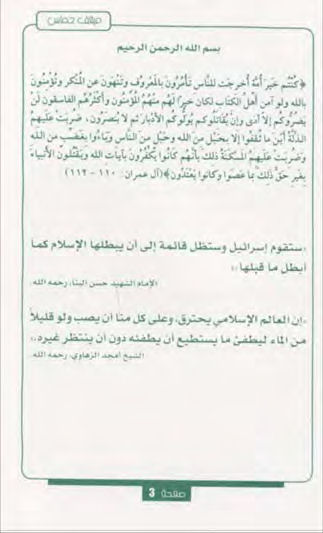
The quotation (top section) attributed to the “martyr imam” Hassan al- Banna at the beginning of the charter: “Israel will arise and continue to exist until Islam wipes it out, as it wiped out what went before.”
That worldview brings in its wake the refusal to recognize the State of Israel’s right to exist as an independent, sovereign nation, the waging of a ceaseless jihad (holy war) against it and total opposition to any agreement or arrangement that would recognize its right to exist. At the beginning of the charter there is a quotation attributed to Hassan Al-Banna, the founder of the Muslim Brotherhood and an important figure in the Hamas pantheon of martyrs, that “Israel will arise and continue to exist until Islam wipes it out, as it wiped out what went before.”
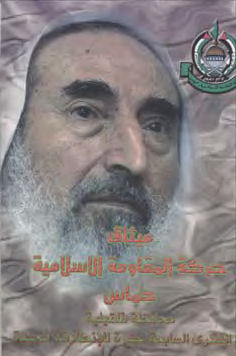
The front cover of the Hamas charter, printed in Qalqilya in 2004. It shows Sheikh Ahmad Yassin, who shaped the charter and gave it its final form.
The practical sphere
In recent years, the Muslim Brotherhood’s relations with Hamas have been reflected in the following:
a. Political, ideological and propaganda support — the Muslim Brotherhood provides Hamas with political, ideological, and propaganda support, attacking the policy of the Egyptian regime when it believes it to be detrimental to Hamas. The propaganda support can be seen on Muslim Brotherhood media.
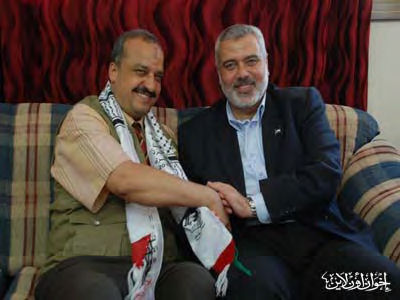
Ismail Haniyah, chief of the Hamas de-facto administration in the Gaza Strip, at a meeting with Dr. Mohammed al-Baltaji, chairman of the Muslim Brotherhood faction in the Egyptian People’s Assembly. Dr. Mohammed al-Baltaji was the leader of the Egyptian delegation aboard the Mavi Marmara.
b. Intensive involvement in the flotillas campaigns and aid convoys to the Gaza Strip — the Egyptian Muslim Brotherhood is intensively involved in flotillas and convoys coming to the Gaza Strip (also through the Egyptian association of doctors, controlled by the movement). An important part in this campaign is played by the Muslim Brotherhood network in Britain and other European countries (in cooperation with radical left-wing elements). The Mavi Marmara flotilla included two Muslim Brotherhood members of the Egyptian People’s Assembly and Muslim Brotherhood activists from Jordan.
c. Financial aid — in a 2006 interview with senior Egyptian Muslim Brotherhood activist Issam al-Aryan, he confirmed the movement’s intention to provide financial assistance to Hamas and stressed its commitment to assisting the Palestinian people. Egyptian media reported that following Operation Cast Lead, the Muslim Brotherhood established a “Gaza Strip rehabilitation fund” to raise 50 million dollars for Hamas. It is unclear to what extent the promise was fulfilled.
On its part, the Egyptian regime was highly concerned over the Hamas takeover of the Gaza Strip (dubbed “an Islamic emirate” by Egyptian media) and the processes of military buildup (by means of smuggling weapons through Egypt) and Islamization taking place in the Gaza Strip. The possibility of terrorism, subversion, and radical Islam spreading from the Gaza Strip to Egypt was considered by the Egyptian regime a threat to Egypt’s national security.
Consequently, the Egyptian regime made an effort to keep the Muslim Brotherhood-Hamas connections to a minimum. Among other things, the regime warned Hamas against contacting the Muslim Brotherhood, detained Muslim Brotherhood elements suspected of holding actual economic and operative contact with Hamas, and foiled the Muslim Brotherhood’s efforts to assist Hamas during sensitive times (by denying the Muslim Brotherhood’s aid convoys the right to cross into the Gaza Strip shortly after Operation Cast Lead, for example). In addition, it waged an ongoing campaign to delegitimize the association between the Gaza Strip movements and Egypt, portraying them as a “conspiracy” (shared by Iran and Hezbollah) to destabilize the region, and Egypt in particular.
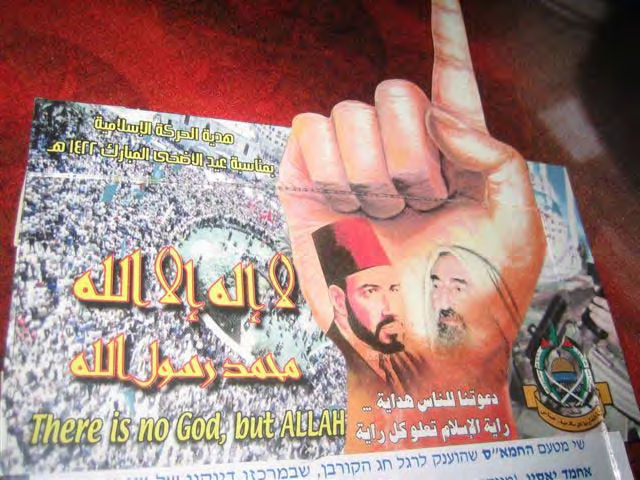
A gift given by Hamas on the occasion of Eid al-Adha, as part of its da’wah activity. Featured in the center are Sheikh Ahmed Yassin and Hassan al-Banna, with the Hamas logo on the right.
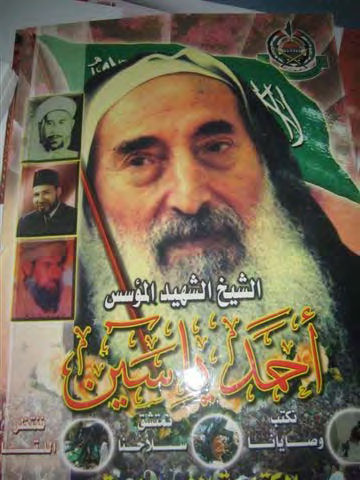
A poster of Sheikh Ahmed Yassin, the founder of Hamas, with other personalities revered by Hamas. From top to bottom: Izz al-Din al-Qassam, Hassan al-Banna, Abdullah Azzam.
This comprehensive analysis of the Muslim Brotherhood (by ITIC) consists of 12 chapters. All 12 chapters are listed below:
Chapter 1: The historical evolution of the Muslim Brotherhood in Egypt
Chapter 2: The ideology of the Muslim Brotherhood
Chapter 3: The Muslim Brotherhood’s education, preaching, and social activity
Chapter 4: The structure and funding sources of the Muslim Brotherhood
Chapter 6: The Muslim Brotherhood’s stance on the Palestinian-Israeli conflict
Chapter 7: The development of political discourse in the Muslim Brotherhood and the 2007 election platform
Chapter 8: Profiles of prominent Muslim Brotherhood figures in Egypt
Chapter 9: The Egyptian Muslim Brotherhood’s ties to its branches in Middle Eastern and Western countries
Chapter 10: The Muslim Brotherhood in other Arab countries and in Europe
Chapter 11: A profile of Sheikh Dr. Yusuf al-Qaradawi
Chapter 12: Islamic jihadist organizations in Egypt ideologically originating in the Muslim Brotherhood
You can download the full study in PDF-format here
Notes:
[63] On the same occasion, Al-Aryan claimed that if a Palestinian state was established, the movement would consider recognizing Israel — later he claimed that his remarks were distorted.
[64] Having been strongly criticized for his remark, both by the public and by the movement’s leadership, Al-Aryan claimed that if the movement came to power, it would act in political ways to help Palestinians regain their rights, stressing that such ways did not entail recognition of Israel.
[65] For more information, download ITIC’s March 23, 2006 Information Bulletin: “The Hamas Charter (1988): Overtly anti-Semitic and anti-West, radical Islamic in outlook, it stresses Hamas’ ideological commitment to destroy the State of Israel through a long-term holy war (jihad)”.



 RSS
RSS




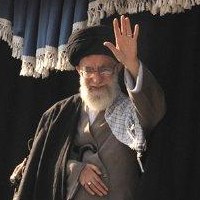
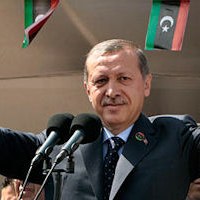




The Muslim Brotherhood’s stance on the Palestinian-Israeli conflict | #Egypt #Islamism http://bit.ly/pVYdhQ
[…] Chapter 6: The Muslim Brotherhood’s stance on the Palestinian-Israeli conflict […]
The Muslim Brotherhood’s stance on the Palestinian-Israeli conflict | #Egypt #Islamism http://bit.ly/pVYdhQ